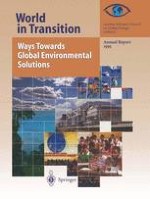1996 | OriginalPaper | Buchkapitel
Exchange of Know-how and Technology Transfer
verfasst von : German Advisory Council on Global Change(WBGU)
Erschienen in: World in Transition: Ways Towards Global Environmental Solutions
Verlag: Springer Berlin Heidelberg
Enthalten in: Professional Book Archive
Aktivieren Sie unsere intelligente Suche, um passende Fachinhalte oder Patente zu finden.
Wählen Sie Textabschnitte aus um mit Künstlicher Intelligenz passenden Patente zu finden. powered by
Markieren Sie Textabschnitte, um KI-gestützt weitere passende Inhalte zu finden. powered by
Research on developing countries and more recent analyses of economic growth in an international comparison of countries point to special features that are important with regard to overcoming global environmental problems: A high variance can be observed in the national growth and/or development rates over time as well as in a regional comparison (Wolf, 1994).Differences in economic development prove to be surprisingly stable over time and do not show any strong convergence tendencies (Wolf, 1994).In spite of this determination of relative stability in development differences, some countries (such as the “four small tigers”, i.e. Hong Kong, South Korea, Singapore and Taiwan) were able to improve their relative position significantly in contrast to the overall trend and this position is still changing (Naya and Takayama 1990; Kulessa 1990, Draguhn 1991).Development or economic growth and pollution do not always have to correlate positively with each other. Below a certain level of development there is poverty-related pollution while above this level economic development and pollution may correlate positively, but do not necessarily do so (WBGU, 1993).Although there has been a positive correlation between economic development and the utilization of environmental resources, it is lower than is presumed in many cases, thus indicating that an explanation of global development and environmental problems requires more comprehensive approaches.
